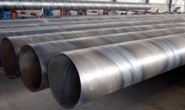Government/Policy

June 12, 2018
Line Pipe Producers Refute Challenges to Section 232 Tariffs
Written by Sandy Williams
Speaking in support of the Section 232 tariffs, the American Line Pipe Producers Association is challenging recent claims by U.S. pipeline developers that they are unable to source sufficient quantities of large-diameter line pipe in the United States.
The large-diameter welded pipe industry in the U.S. is operating at its lowest capacity in years—well under 40 percent—and, if given the opportunity, is “ready, able and eager” to supply pipeline operators, says ALPPA.
“U.S. producers can make virtually everything demanded for American pipeline projects, and they do so using domestic steel,” said Tim Brightbill, trade counsel to ALPPA. “Complaints by industry groups such as the Interstate National Gas Association of America (INGAA) and the Association of Oil Pipe Lines (AOPL) are completely unfounded. There is no reason why U.S. pipeline projects should not be using U.S.-manufactured large-diameter line pipe.”
A second allegation ALPPA refutes is that pipeline projects will be put on hold due to the high cost of Section 232 tariffs. Pipeline costs have been exaggerated, said ALPPA. Although tariffs may increase the price of imported pipe, large-diameter welded pipe accounts for only 20 percent of the total pipeline project cost, and pipeline projects continue to be highly profitable.
ALPPA notes that pipeline operators continue to rely on imports despite the tariffs, resulting in lost bids for domestic producers and further injury from “dumped and subsidized imports” of large-diameter pipe.
The Trump administration is correct in concluding that imports of steel pipe threaten U.S. national security and critical infrastructure, says ALLPA, pointing to affirmative preliminary determinations by the U.S. International Trade Commission in antidumping and countervailing duty investigations on pipe imports from Canada, China, Greece, India, Korea and Turkey.
“ALPPA strongly opposes requests from pipeline operators to be excluded from the steel Section 232 tariffs,” said the association.







